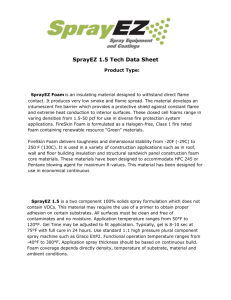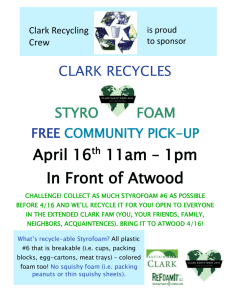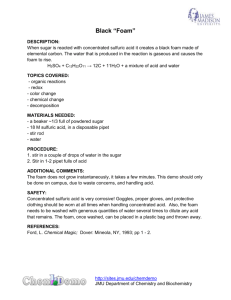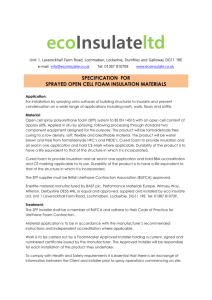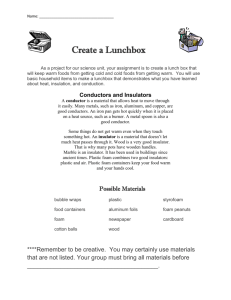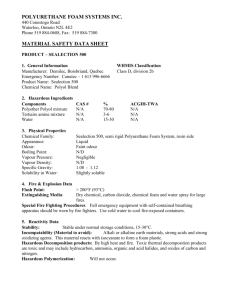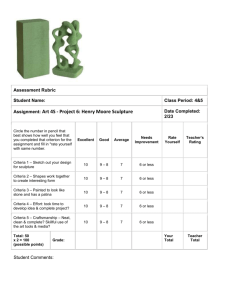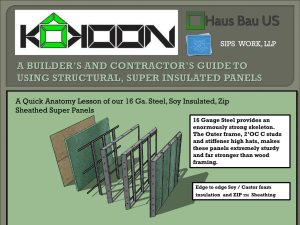Hazard Communication Safety Data Sheet - ESP® Low
advertisement
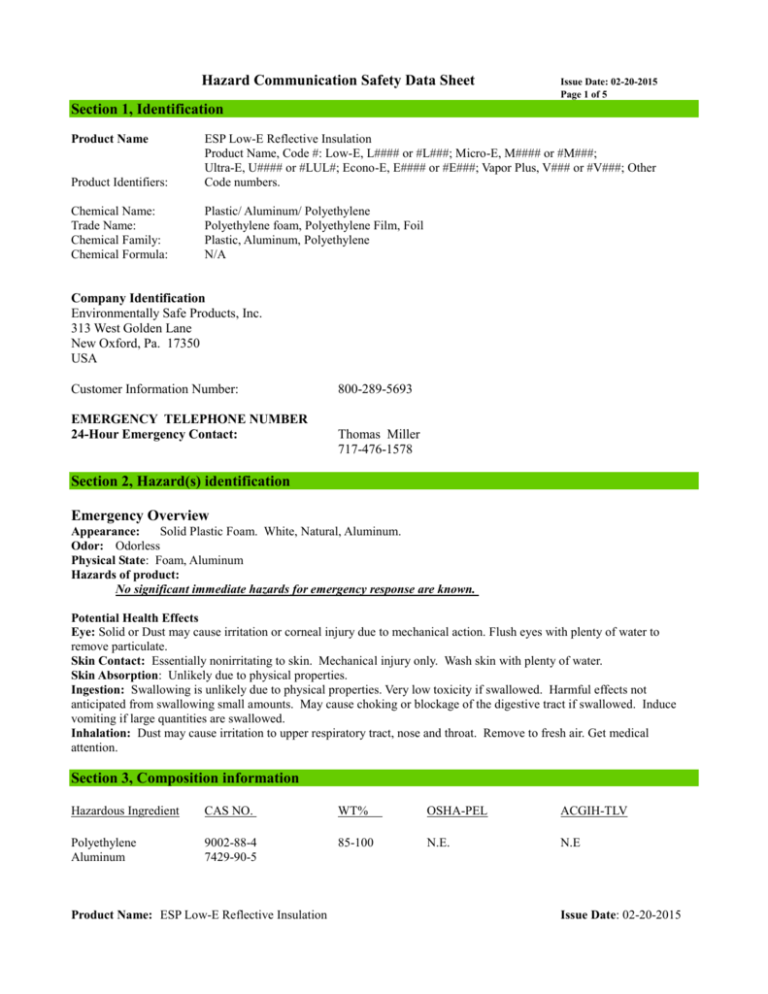
Hazard Communication Safety Data Sheet Issue Date: 02-20-2015 Page 1 of 5 Section 1, Identification Product Name Product Identifiers: ESP Low-E Reflective Insulation Product Name, Code #: Low-E, L#### or #L###; Micro-E, M#### or #M###; Ultra-E, U#### or #LUL#; Econo-E, E#### or #E###; Vapor Plus, V### or #V###; Other Code numbers. Chemical Name: Trade Name: Chemical Family: Chemical Formula: Plastic/ Aluminum/ Polyethylene Polyethylene foam, Polyethylene Film, Foil Plastic, Aluminum, Polyethylene N/A Company Identification Environmentally Safe Products, Inc. 313 West Golden Lane New Oxford, Pa. 17350 USA Customer Information Number: EMERGENCY TELEPHONE NUMBER 24-Hour Emergency Contact: 800-289-5693 Thomas Miller 717-476-1578 Section 2, Hazard(s) identification Emergency Overview Appearance: Solid Plastic Foam. White, Natural, Aluminum. Odor: Odorless Physical State: Foam, Aluminum Hazards of product: No significant immediate hazards for emergency response are known. Potential Health Effects Eye: Solid or Dust may cause irritation or corneal injury due to mechanical action. Flush eyes with plenty of water to remove particulate. Skin Contact: Essentially nonirritating to skin. Mechanical injury only. Wash skin with plenty of water. Skin Absorption: Unlikely due to physical properties. Ingestion: Swallowing is unlikely due to physical properties. Very low toxicity if swallowed. Harmful effects not anticipated from swallowing small amounts. May cause choking or blockage of the digestive tract if swallowed. Induce vomiting if large quantities are swallowed. Inhalation: Dust may cause irritation to upper respiratory tract, nose and throat. Remove to fresh air. Get medical attention. Section 3, Composition information Hazardous Ingredient CAS NO. WT% OSHA-PEL ACGIH-TLV Polyethylene Aluminum 9002-88-4 7429-90-5 85-100 N.E. N.E Product Name: ESP Low-E Reflective Insulation Issue Date: 02-20-2015 Page 2 of 5 Section 4, First-aid measures Eye Contact: Flush eyes with plenty of water to remove particulate. Only mechanical effects expected. Consult physician. Skin Contact: Wash with soap and water. Ingestion: Not likely route of exposure. If large amounts swallowed, seek medical attention. May cause gastrointestinal blockage. Do not give laxatives, and do not induce vomiting unless directed by medical personnel. Inhalation: Move person to fresh air; if effects occur, consult a physician. Section 5, Fire Fighting Measures Flash Point: Melt Point : Polyethylene: Above 450 degrees Polyethylene: 98-106 degrees C Extinguishing Media: Water fog or fine spray. Dry chemical fire extinguishers. Carbon dioxide fire extinguishers. .Foam. Fire Fighting Procedures: Keep people away. Isolate fire and deny unnecessary entry. Soak thoroughly with water to cool and prevent re0-ignition. If material is molten, do not apply direct water stream. Use fine water spray or foam. Cool surroundings with water to localize fire zone. Hand held dry chemical or carbon dioxide extinguishers may be used for small fires. Special Protective Equipment for Firefighters: Wear positive-pressure self- contained breathing apparatus (SCBA) and protective fire fighting clothing (includes fire fighting helmet,coat, trousers, boots and gloves). If protective equipment is not available or not used, fight fire from a protected location of safe distance. Unusual Fire and Explosion Hazards: Trace amounts of residual blowing agent may be present in the foam. Mechanical and thermal processes may produce dust and flammable vapors which may be potential explosion hazards. Tightly sealed containers may burst under fire or intense heat. Dense smoke is emitted when burned without sufficient oxygen. Hazardous Combustion Products: During a fire, smoke may contain the original material in addition to combustion products of varying composition which may be toxic and or irritating. In smoldering or flaming condition, carbon monoxide, carbon dioxide, carbon dioxide and carbon are generated. Based on combustion toxicity testing, the effects of combustion from this foam are not more acutely toxic than the effects of combustion from common building materials such as wood. Section 6, Accidental Release Measures Steps to be Taken if Material is Released: Handle as general inert material. See Section 13, Disposal consideration, for additional information. Personal Precautions: There are no special required instructions. Environmental Precautions: There are no special instructions. Section 7, Handling and Storage Handling General Handling: Mechanical cutting, or sawing can cause formation of dusts. To reduce the potential for dust explosion, do not permit dust to accumulate. This product is combustible and may constitute a fire hazard if improperly used or installed. Storage Store in a cool, dry place. Keep away from high temperatures and hot pipes. Store away from direct sunlight. This material is combustible and should not be exposed to flame or other ignition sources. This polyethylene foam is made with flammable hydrocarbon blowing agent, most of which is removed prior to shipment. However, residual flammable vapors may gradually exhaust from the foam during storage, fabrication or use. Avoid close confinement of large foam quantities and sources of ignition near the foam. (ie: smoking, sparks, flames.) Do not store near heating equipment. Burns readily when exposed to plentiful and hot ignition sources. Use self-contained breathing apparatus in the event of fire. Product Name: ESP Low-E Reflective Insulation Issue Date: 02-20-2015 Page 3 of 5 Section 8, Exposure Controls/ Personal Protection Exposure Limits Although some of the additives used in this product may have exposure guidelines, these additives are encapsulated in the product and no exposure would be expected under normal handling conditions. Personal Protection Eye/Face Protection: Eye protection should not be necessary. Skin Protection: No precaution other than clean body-covering clothing should be needed. Hand Protection: Chemical protective gloves should not be needed when handling this material. Consistent with general hygienic practices for any material, skin contact should be minimized. Use gloves to protect from mechanical injury. Selection of gloves will depend on task. Respiratory Protection: When respiratory protection is required from certain operation, including but not limited to hotwire cutting, use an approved air-purifying respirator. Ingestion: No precaution necessary due to the physical properties of the material. Engineering Controls Ventilation: Good general ventilation should be sufficient for most conditions. Local exhaust ventilation may be necessary for some operations. Section 9, Physical and Chemical Properties Product Type: Color: Odor: Boiling Point: Freezing Point: Vapor Density (Air=1): Melt Point (foam): Specific Gravity (foam): Bulk Density: % Volatile by Volume: Solubility in Water: Aluminum Foil, Polyethylene foam/ Polyethylene film. Aluminum, White, Natural, Black, Light Green and other colors Odorless N.A. N.A. N.A. 98-106 degrees C. 0.05-0.04 1.0-1.2 lb./cu. ft. Nil Not soluble. Section 10, Stability and Reactivity Stability/Instability Thermally stable at typical use temperatures. Conditions to Avoid: Avoid temperatures above 158 degrees F. Product decomposes above: 482 degrees F). Avoid direct sunlight. Incompatible Materials: Avoid contact with: Strong oxidizers. Hazardous Polymerization: Will not occur. Thermal Decomposition Decomposition products depend upon temperature, air supply and presence of other materials. Processing may release fumes and other decomposition products. At temperatures exceeding melt temperatures, polymer fragments can be released. Fumes can be irritating. Product Name: ESP Low-E Reflective Insulation Issue Date: 02-20-2015 Page 4 of 5 Section 11, Toxicological Information Repeated Dose Toxicity: Based on available data, repeated exposures are not anticipated to cause significant adverse effects. Section 12, Ecological Information Chemical Fate: Movement & Partitioning No bio concentration is expected because of the relatively high molecular weight. In the terrestrial environment, material is expected to remain in the soil. In the aquatic environment, material is expected to float. Persistence and Degradbility Surface photo-degradation is expected with exposure to sunlight. No appreciable bio-degradation is expected. Ecotoxicity Not expected to be acutely toxic to aquatic organisms. Section 13, Disposal Considerations Reuse, recycle, incinerate, or dispose in approved landfill. Follow all regulatory requirements for disposal. Waste characterizations and compliance with applicable laws are the responsibility solely of the waste generator. ESP has no control over the management practices or manufacturing processes of parties handling or using this material. The information presented here pertains only to the products as shipped in its intended condition as described. Section 14, Transport Information DOT: Not regulated IMO: Not regulated. IATA/ICAO Class: Not regulated. WARNING: Transport large quantities of this polyethylene foam in ventilated vehicles. Exercise caution when opening vehicles containing this polyethylene foam to avoid all possible sources of ignition (lit tobacco, sparks, etc.) near the foam and vehicle. Section 15, Regulatory Information OSHA Hazard Communication Standard this product is not a “hazardous chemical” as defined by the OSHA Hazard Communication Standard, 26 CFR 1910.1200. Superfund Amendments and Re-authorization Act of 1986 Title III (Emergency Planning and Community Right-toKnow Act of 1986) Sections 311 and 312 Immediate (acute) Health Hazard: NO Delayed (chronic) Health Hazard: NO Fire Hazard: NO Reactive Hazard: NO Sudden Release of Pressure Hazard: NO Superfund Amendments and Re-authorization Act of 1986 Title III (Emergency Planning and Community Right-toKnow Act of 1986) Section 313 To the best of our knowledge, this product does not contain chemicals at levels which require reporting under this statute. Product Name: ESP Low-E Reflective Insulation Issue Date: 02-20-2015 Page 5 of 5 Pennsylvania (Worker and Community Right-to-Know Act): Pennsylvania Hazardous Substances List and or Pennsylvania Environmental Hazardous Substance List: To the best of our knowledge, this product does not contain chemicals at levels which require reporting under this statute. Pennsylvania (Workers and Community Right-to-Know Act): Pennsylvania Special Hazardous Substances List: To the best of our knowledge, this product does not contain chemicals at levels which require reporting under this statue. California Proposition 65 (Safe Drinking Water and Toxic Enforcement Act of 1986) This product contains no listed substances known to the State of California to cause cancer, birth defects or other reproductive harm, at levels which would require a warning under the statute. US. Toxic Substances Control Act All components of this product are on the TSCA inventory or are exempt from TSCA Inventory requirements under 40 CFR 720.30. CEPA- Domestic Substance List (DSL) All substances contained in this product are listed on the Canadian Domestic Substances List (DSL) or are not required to be listed. 16, Other Information Environmentally Safe Products, Inc. urges each customer or recipient of the SDS to study it carefully and consult with appropriate expertise, as necessary or appropriate, to become aware of an understand the data contained in this MSDS (SDS) and any hazards associated with the product. The information herein is provided in good faith and believed to be accurate as of the effective date shown above. However, no warranty , express or implied, is given. Regulatory requirements are subject to change and may differ between various locations. It is the buyers /user's responsibility to ensure that his activities comply with all federal, state, and local laws. The information presented here pertains only to the product shipped. Since conditions for use of the product are not under the control of the manufacturer, it is the buyers/user's duty to determine the conditions necessary for the safe use of this product. Due to the proliferation of sources for information such as MSDS, we're not and can not be responsible for MSDS/SDS obtained from any source other than ourselves. If you have obtained an MSDS/SDS from another source or if you are not sure that the MSDS/SDS you have is current, please contact us for the most current version: 800-289-5693.
